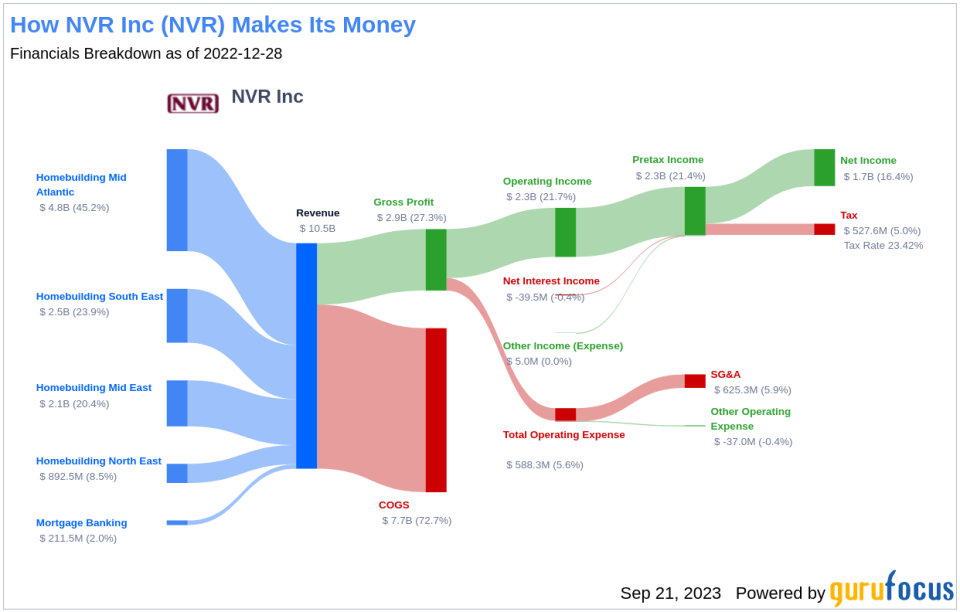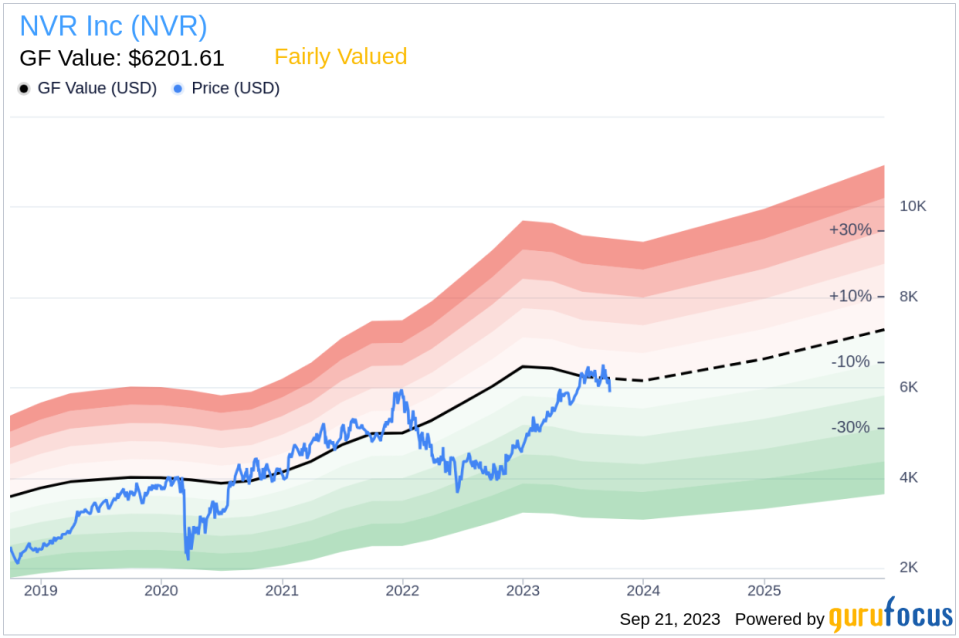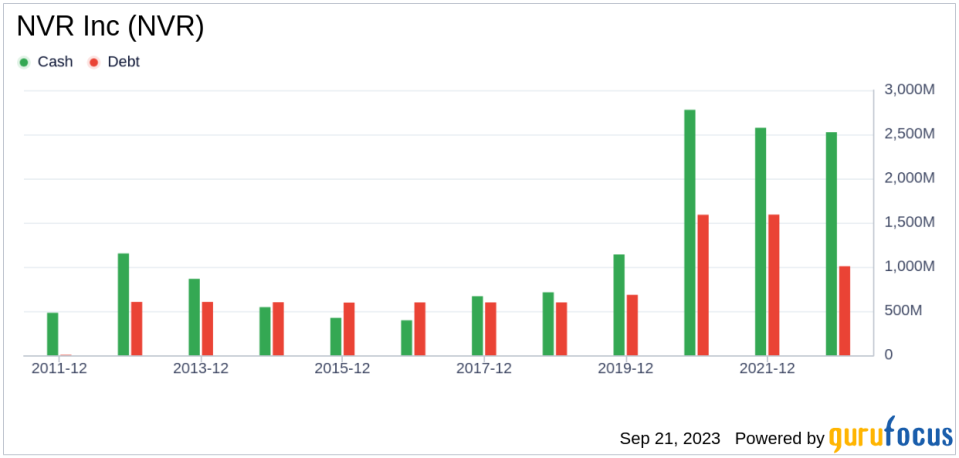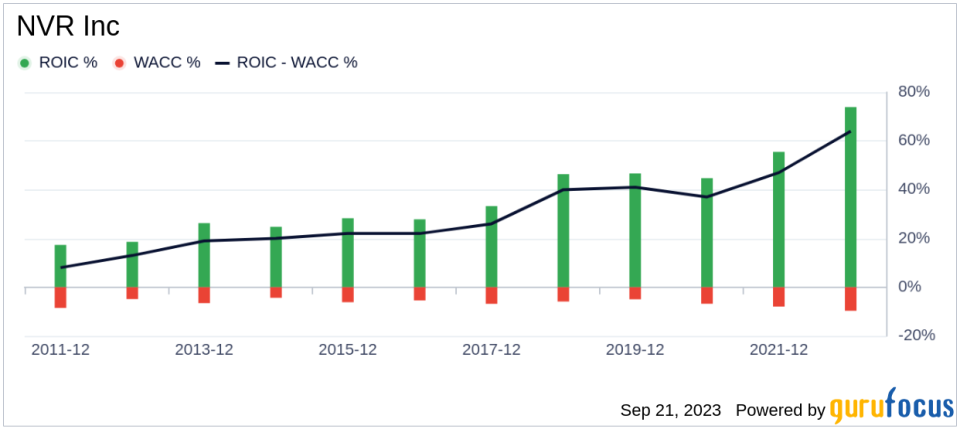Unveiling NVR (NVR)'s Value: Is It Really Priced Right? A Comprehensive Guide
On September 21, 2023, NVR Inc (NYSE:NVR) ended the trading day with a minor loss of 4.4%, despite a 2.5% gain over the past three months. With an impressive Earnings Per Share (EPS) of 468.38, it prompts the question: Is NVR (NYSE:NVR) fairly valued? In this article, we delve into a comprehensive analysis of NVR's financial performance and valuation to answer this question. We encourage you to read on for a deeper understanding of the company's financial health and future prospects.
Company Overview
NVR Inc, a prominent homebuilding company based in the United States, operates in over 33 metropolitan areas across the east of the Mississippi River. The company constructs single-family detached homes, townhomes, and condominium buildings under three brands: Ryan Homes, NVHomes, and Heartland Homes. NVR's unique strategy of avoiding direct land development activity has resulted in relatively high return metrics. The company also manages mortgage banking and homebuilding operating segments, divided into four geographic areas; Mid-Atlantic, North East, Mid-East, and South East.
At its current price of $5862.33 per share, NVR (NYSE:NVR) has a market cap of $19.10 billion. When compared to the GF Value of $6201.61, the stock appears to be fairly valued. This conclusion is based on a comprehensive evaluation of the company's historical trading multiples, past performance, and future business performance estimates.
Understanding the GF Value
The GF Value is a proprietary measure that represents the current intrinsic value of a stock. It is derived from historical trading multiples, a GuruFocus adjustment factor based on past performance and growth, and future business performance estimates. The GF Value Line on our summary page provides an overview of the fair value at which the stock should ideally be traded. If the stock price is significantly above the GF Value Line, it is overvalued, and its future return is likely to be poor. Conversely, if it is significantly below the GF Value Line, its future return will likely be higher.
Based on the GF Value calculation, NVR (NYSE:NVR) appears to be fairly valued. This suggests that the long-term return of its stock is likely to be close to the rate of its business growth.
Link: These companies may deliver higher future returns at reduced risk.
Financial Strength
Assessing the financial strength of a company is crucial before investing in its stock. Investing in companies with poor financial strength poses a higher risk of permanent loss. A great way to understand the financial strength of a company is by looking at the cash-to-debt ratio and interest coverage. NVR has a cash-to-debt ratio of 2.65, which is better than 77.36% of 106 companies in the Homebuilding & Construction industry. The overall financial strength of NVR is 9 out of 10, indicating strong financial health.
Profitability and Growth
Investing in profitable companies, especially those with consistent profitability over the long term, is less risky. A company with high profit margins is usually a safer investment than those with low profit margins. NVR has been profitable 10 times over the past 10 years. Over the past twelve months, the company had a revenue of $10 billion and Earnings Per Share (EPS) of $468.38. Its operating margin is 20.38%, which ranks better than 87.16% of 109 companies in the Homebuilding & Construction industry. Overall, the profitability of NVR is ranked 10 out of 10, indicating strong profitability.
Growth is one of the most critical factors in the valuation of a company. If a company's business is growing, it usually creates value for its shareholders, especially if the growth is profitable. Conversely, if a company's revenue and earnings are declining, the value of the company will decrease. NVR's 3-year average revenue growth rate is better than 71.29% of 101 companies in the Homebuilding & Construction industry. NVR's 3-year average EBITDA growth rate is 34.6%, which ranks better than 69.15% of 94 companies in the Homebuilding & Construction industry.
ROIC vs WACC
One can also evaluate a company's profitability by comparing its return on invested capital (ROIC) to its weighted average cost of capital (WACC). ROIC measures how well a company generates cash flow relative to the capital it has invested in its business. WACC is the rate that a company is expected to pay on average to all its security holders to finance its assets. If the ROIC exceeds the WACC, the company is likely creating value for its shareholders. During the past 12 months, NVR's ROIC was 61.97, while its WACC was 8.9.
Conclusion
In summary, the stock of NVR (NYSE:NVR) appears to be fairly valued. The company's financial condition is strong, and its profitability is robust. Its growth ranks better than 69.15% of 94 companies in the Homebuilding & Construction industry. To learn more about NVR stock, you can check out its 30-Year Financials here.
To find out the high-quality companies that may deliver above-average returns, please check out GuruFocus High Quality Low Capex Screener.
This article first appeared on GuruFocus.




